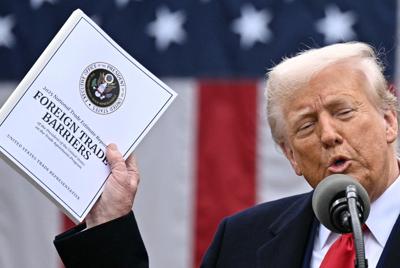In her April 8 Community Perspective entitled “The Legality of Trump’s Tariffs,” Barbara Haney criticizes the recent “Bridge the Divide” event that discussed whether President Trump’s tariffs, amongst other actions, exceed the presidential powers granted under The Constitution of the United States of America.
Ms. Haney asserts that the panel was incorrect and proceeds to list a smattering of federal laws and U.S. Supreme Court opinions that she believes clearly place President Trump’s tariff policies as lawful and constitutional.
While I share Ms. Haney’s skepticism of the panel’s “bipartisan nature” and expertise in trade policy and constitutional law, she also overconfidently states her case. The president can impose tariffs, but limitations exist. Context and the particular law relied upon are crucial variables.
Throwing a basketful of laws into the air and declaring “Take that! You gender studies buffoons!” isn’t exactly definitively dunking on the opposition.
Drawing from the “Liberation Day” and other White House tariff related press releases, President Trump asserts that fentanyl, domestic manufacturing jobs, trade deficits, value-added taxes, and currency manipulation constitute a “national emergency” and that under the International Emergency Economic Powers Act of 1977 (IEEPA), his tariffs are needed and lawful.
Additionally, the Trump administration has floated the idea of tariffs either partly or wholly replacing income taxes.
With context and the specific law now established, we can ask: Are President Trump’s tariffs constitutional? A number of organizations and legal experts say “No” for the following reasons:
A lawsuit filed by The New Civil Liberties Alliance (NCLA) argues the tariffs against Chinese imports exceed the IEEPA’s statutory authority, violate the “Major Questions Doctrine,” and if in fact authorized by the IEEPA, the statute itself may violate the “Nondelegation Doctrine” which prohibits Congress from transferring “powers which are strictly and exclusively legislative” (i.e.: imposing tariffs and regulating foreign commerce). Another public interest law firm, the Liberty Justice Center, which successfully litigated the 2018 Janus v. AFSCME decision, is exploring challenging Trump’s tariffs on similar grounds.
As it relates to tariffs, the “Major Questions Doctrine” developed by the U.S. Supreme Court requires Congress to “speak clearly” when authorizing the president to make “decisions of vast ‘economic and political significance.’” If statutory ambiguity exists, the courts are to presume that Congress did not grant the power claimed by the executive agency. While Congress has granted some tariff authority to the Executive Branch, it so far has not granted the president the power to decide “major public policy” questions regarding whether government should be primarily funded through tariffs or income taxes or to impose such sweeping tariffs to address the White House’s perceived grievances. Trump’s tariffs are unambiguously of “vast economic and political significance.”
Another question is whether the justifications cited by President Trump are truly “national emergencies.” An emergency is “an unforeseen combination of circumstances or the resulting state that calls for immediate action.” The various raison d’être presented for the tariffs have been known and debated in the United States for decades. Can they therefore really be considered “national emergencies?”
Admittedly, I am not a trade policy or constitutional law expert. However, the arguments presented above are by those who are — either in academia or through professional careers. Their writings on these subjects can be found via the Volokh Conspiracy hosted by the Reason Foundation, the Cato Institute and the Lawfare Institute.
The constitutionality of President Trump’s tariffs is not settled. They are sweeping, poorly reasoned and crafted, and have disrupted the global economy. They are also ultimately a tax that will be borne by Americans. Article I, Section 8 of the U.S. Constitution states that Congress, not the president, has the power to regulate commerce with foreign nations and to impose taxes, duties, imposts and excises. President Trump’s economic policies and governing principles increasingly bear resemblance to a certain king and parliament that 13 colonies took issue with during the 1700s.
I encourage watching Sen. Rand Paul’s April 2 speech regarding President Trump’s tariff actions. To quote Sen. Paul: “Tariffs are taxes, and the power to tax belongs to Congress — not the president. Our founders were clear: tax policy should never rest in the hands of one person. Abusing emergency powers to impose blanket tariffs not only drives up costs for American families but also tramples on the Constitution ... ”
For more on the well-meaning but misguided nature of tariffs, a reading of Frederick Bastiat’s “Candlemakers’ Petition” is good start.
Ernest Prax resides in North Pole and yes, is a member of "that Prax family."












